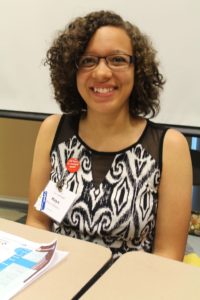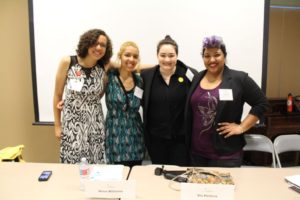Growing up, I was raised in a home where I was allowed to process what it meant for me to be mixed; especially since a mixed race single mother has primarily raised me. However, I haven’t seen a lot of representation of mixed race people in the sense of being generationally mixed, and I haven’t seen a lot of spaces where people can process their mixedness outside of their households.
I related and didn’t relate at the same time to articles, and popular TV and film characters that identified as biracial due to having monoracial parents of different races. Other than through poetry, I didn’t know how to externally process how difficult it has been for me to engage in conversations about racial identity as someone who identifies as generationally multiracial.

After reading an article from Vox about things people needed to know about being biracial, and noticing how one of the points included the inclusion for generationally mixed, I became excited, and started Googling more on the topic.
Two search pages over came a quote from Misty Copeland that was on the Mixed Remixed Festival’s site. I became even more ecstatic!
After reading through the festival’s celebrity quote page for a bit, I read more about the site. The Mixed Remixed festival prepared for a huge event every year catering to various multiracial people’s stories, interracial couples’ stories, and even transracial families’ stories; on that note, it was nice to see the word “transracial” used properly in a non-Rachel Dolezal context.
Whether you had mixed race children as a monoracial person, whether you were of two or more races, whether you were generationally mixed, you had a place there in person at the festival, and online on their social media platforms.
I followed them on Twitter and Facebook immediately.
I didn’t even think anyone from Mixed Remixed’s staff would respond to my tweets, either, but I’m so glad they did. I tweeted them asking if they were able to find articles about someone mixed similar to my mixed identity. I tweeted them thanking them for such an awesome platform. I tweeted them questions they asked about favorite movies that has mixed race characters, and other things along the lines of that.
What I did not expect to tweet at them was something from my blog.
I don’t remember if it was prose, a poem, or a short story, but I do remember tweeting something. And a bit afterwards, I got a tweet back from them that stated, “Keep writing!”
And I totally did.
I haven’t written things often about what it meant to be mixed race in my work until interacting with the Mixed Remixed Festival. A piece of writing that gained the most feedback was a poem I wrote about what dating is like for mixed race women, particularly for me as a mixed race woman. Not only was I still writing on my blog, but I also submitted my poems and short stories about mixed race experiences for my university’s publications, and those have been well received.
It pushed me to hone my writing that would make people discussed mixed race people and mixed race identity. It eventually encouraged me to participate in video projects, such as my university’s #ECUWithoutMe campaign, and the 100% Mixed Show’s #Mixstory campaign.
More and more people were starting to hear my story, and most people have actually given me positive feedback for it. It was so refreshing; I didn’t expect any of that to happen!
So, what was next?
I was unsure of whether or not I would get in, but I submitted an application to be a panelist at the Mixed Remixed Festival for June 2016. After I sent my application, I kept thinking, “Oh, I probably won’t be accepted. There are published, more successful writers who are on their panels, there’s no way they’re going to accept me.” I wasn’t a “real” writer, whatever that meant.
Whether I was going to be a panelist or not, I was still going to go. Whether I was going to be a panelist or not, I was not going to miss out on this opportunity.
Then, I started focusing my energy on applying for my summer internship with Hillside Missions. When I got accepted, I still didn’t know my starting date, but since I didn’t hear back from Mixed Remixed yet, I thought, “Hey, it shouldn’t be a big deal, I probably won’t be accepted as a panelist.”
“I’m not a ‘real’ writer.”
I assume you know where this is going.
March came along…and I got selected to be a panelist for the Mixed Millennials panel!
Ahhhhh!!!
That’s right! I was a real writer. No, I AM a real writer!
Wait…when was I starting my internship? Where was I going to stay? How was I going to get there? How long would I be able to stay?
As excited as I was to get that email, I had to email back to say that I needed a few days to gather everything before I sent a confirmation.
I contacted my internship’s office, and was able to start on time and attend the festival. I was able to stay with a cousin. Although I was going to pay for two online classes for the summer, I paid for one so that I could pay for my plane ticket. And although I was only able to make it for the second part of the festival so that I didn’t miss my sister’s graduation vacation, I was still able to be a panelist and experience what the festival was like.
Out of all the things that could have brought me to California for the first time, the Mixed Remixed Festival did that, and I am so glad and proud that it did.
Because the festival has helped me grow so much, I was able to become a writer for an online medium called The Tempest, and was able to write pieces about my mixed experiences.
I continue to find new ways to contribute pieces about being generationally mixed.
I have been able to focus my social work research on the mixed experience in my undergrad.
I intend to apply as a panelist and a spoken word performer for 2017’s Mixed Remixed Festival, and I am now a blogger for the Mixed Remixed Festival.
It has been such a blessing to be a part of a platform that has helped me grow and become more vocal as a Black, White, and Native American second generation mixed woman.
I’m looking forward to see what’s to happen next!
—Maya Williams, Blogger for the Festival

